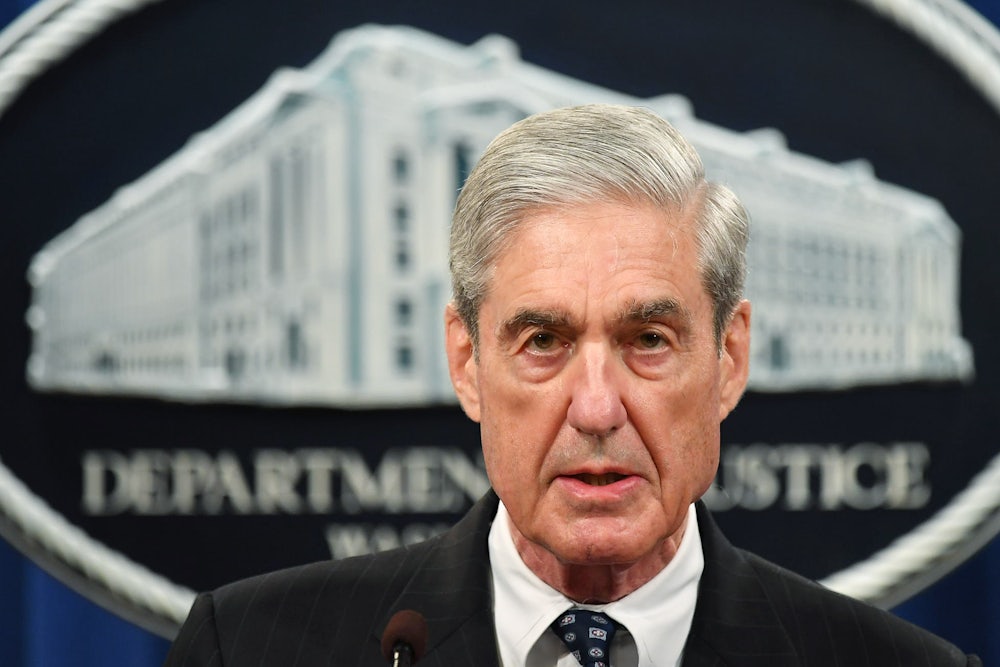Special counsel Robert Mueller’s surprise press conference on Wednesday morning contained no surprises. He offered no new evidence that could be used against President Donald Trump, and reiterated what he’d already made clear in his report last month: Only Congress can hold Trump accountable for obstructing justice in the Russia investigation.
But Mueller’s brief media appearance wasn’t entirely pointless. It underscored the gravity of his findings—and House Democrats’ inexcusable failure to respond to them.
Speaker Nancy Pelosi has often criticized the president for taking lawless actions, while tamping down impeachment chatter in her caucus. Steny Hoyer, Pelosi’s deputy, said after the Mueller report’s release that impeachment is “not worthwhile.” Adam Schiff, the chairman of the House Intelligence Committee, has suggested it’s a pointless endeavor as long as Republicans control the Senate. And Jerry Nadler, who would oversee the process as the House Judiciary chairman, has said that “all options are on the table,” but effectively ruled out impeachment under most circumstances.
Attorney General Bill Barr and the White House, meanwhile, have gone to great lengths to spin the Mueller report as an exoneration of a wronged president. Mueller made clear on Wednesday, however, that its damning accounts of Trump’s efforts to sabotage the Russia investigation point in a different direction. “If we had confidence that the president clearly did not commit a crime, we would have said that,” he told reporters. “We did not, however, make a determination as to whether the president did commit a crime.”
The president’s defenders have often downplayed obstruction of justice as a “process crime” and suggested that it’s not worth pursuing if there’s no collusion charges. But Mueller made clear on Wednesday that the two lines of inquiry were inseparable. “The matters we investigated were of paramount importance,” he explained. “It was critical for us to obtain full and accurate information from every person we questioned. When a subject of an investigation obstructs that investigation or lies to investigators, it strikes at the core of the government’s effort to find the truth and hold wrongdoers accountable.”
Mueller did not say outright that his 448-page report amounts to an impeachment referral against the president. Instead, he made clear that the primary obstacle to charging Trump with obstruction wasn’t the evidence itself, but the Justice Department’s guidelines for its prosecutors. He pointed specifically to a 1973 opinion by the Office of Legal Counsel concluding that a sitting president can’t be indicted. “That is unconstitutional,” Mueller said on Wednesday. “Even if the charge is kept under seal and hidden from public view, that too is prohibited.”
This isn’t news. The special counsel’s office already laid out in far greater detail in the report last month why DOJ guidelines prevented him from charging the president with a crime or even considering the possibility of doing so. Though that conclusion isn’t without its critics, Mueller considered it binding on his office. But he also elaborated on Wednesday why he amassed all of the evidence and made it public.
“First, the opinion explicitly permits the investigation of a sitting president because it is important to preserve evidence while memories are fresh and documents are available,” he explained. “Among other things, that evidence could be used if there were co-conspirators who could now be charged. And second, the opinion says that the Constitution requires a process other than the criminal justice system to formally accuse a sitting president of wrongdoing.” Though he didn’t say the magic word, impeachment is the only constitutional process he could mean.
As if to underline his point, Mueller ruled out a voluntary appearance before Congress to testify about his investigation. “I hope and expect this to be the only time that I will speak about this matter,” he said. “I am making that decision myself—no one has told me whether I can or should testify or speak further about this matter.” In theory, the special counsel could still be forced to testify before lawmakers with a subpoena, but Mueller indicated he had nothing more to offer them if hauled before a committee.
“Any testimony from this office would not go beyond our report,” he said. “It contains our findings and analysis, and the reasons for the decisions we made. We chose those words carefully, and the work speaks for itself. The report is my testimony. I would not provide information beyond that which is already public in any appearance before Congress.” In other words, he’s already done his job. Now it’s the House’s turn.
But shortly after Mueller wrapped up his damning press conference, House Democrats gave perhaps the most bewildering response possible: They called for even more investigations. “The Congress holds sacred its constitutional responsibility to investigate and hold the president accountable for his abuse of power,” Pelosi said in a statement. “The Congress will continue to investigate and legislate to protect our elections and secure our democracy. The American people must have the truth.”
Other leading House Democrats joined the chorus. “After his press conference this morning, I believe that Special Counsel Mueller needs to testify before Congress, and I continue to call on Attorney General Barr to release the full, unredacted report to Congress,” Hoyer said in a statement. Nadler declared in a lengthy statement that Congress would “respond to the crimes, lies, and other wrongdoing of President Trump,” but without saying how.
The most favorable reading of this reaction is that Pelosi and her allies are still waiting for some kind of magic phrase or smoking gun to legitimize an impeachment process. The least-favorable reading is that they either don’t think Trump’s abuses of power justify impeachment, or that they’re too spooked of a hypothetical voter backlash to fulfill their constitutional duties. In any event, the result is the same. What could be justified as caution is now indistinguishable from cowardice.
